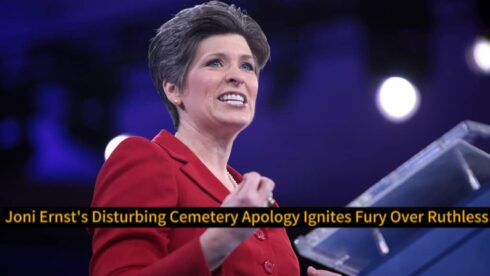Joni Ernst, Republican Senator from Iowa, ignited a political firestorm this weekend after posting a bizarrely staged “apology” video from a cemetery. With tombstones quietly framing her, Ernst expressed regret—though critics argue it was anything but sincere—for the lives potentially affected by the Medicaid cuts she plans to support. Rather than backing down, she doubled down, calling the cuts “necessary to preserve America’s financial future,” as she stood amid symbols of mortality.
The video, posted across Joni Ernst’s official social media accounts, immediately drew condemnation from public health advocates, Democrats, and even some moderate Republicans. The optics—apologizing for death while surrounded by graves—were widely seen as grotesque and out-of-touch. Though Ernst claimed the cemetery setting was chosen to “honor those we’ve lost,” her continued insistence on cutting Medicaid suggested a tone-deaf approach to one of the nation’s most vital social safety nets.
A Calculated Move: Joni Ernst’s Video Linked to Upcoming Budget Vote
Joni Ernst began her cemetery address by stating, “I know this may be difficult to hear, but hard truths must be faced.” Those hard truths, according to her, involve scaling back Medicaid to curb what she described as “reckless entitlement expansion.” Political analysts believe this video was no accident—it was strategically timed ahead of the upcoming Senate budget vote that could slash billions from federal Medicaid funding.
Critics argue that Joni Ernst’s message was less about fiscal discipline and more about preemptively controlling the narrative before her controversial vote. Her use of a graveyard as a backdrop was seen as a macabre metaphor, intentionally blending symbolism with messaging. Rather than showing contrition, Ernst’s “apology” appeared to be a dramatic and manipulative ploy aimed at rallying fiscal conservatives while anesthetizing public outrage.
Healthcare Experts Warn of Dire Consequences from Medicaid Cuts
Joni Ernst claimed in her video, “We must tighten our belts today to prevent suffering tomorrow,” but healthcare professionals are warning that her belt-tightening will cause immediate, catastrophic harm. Experts point out that the proposed Medicaid cuts could leave over 10 million Americans—including children, disabled individuals, and low-income families—without access to essential medical care.
According to a policy analysis by the Center on Budget and Policy Priorities, the Senate’s current proposal, which Ernst has vocally endorsed, would slash Medicaid funding by 26% over the next decade. That includes eliminating the ACA Medicaid expansion and imposing caps that fail to keep up with medical inflation. Health equity advocates say this will lead to “a silent epidemic” of preventable deaths—ironically foreshadowed by Ernst’s cemetery backdrop.
Democrats and Activists Slam Ernst for ‘Performative Cruelty’

“Joni Ernst just turned death into a campaign prop,” said Senator Bernie Sanders in a fiery rebuke during a press conference. Across the political spectrum, Ernst’s cemetery video has been labeled as one of the most tasteless political performances in recent memory. Progressive organizations like MoveOn and Indivisible have launched targeted ad campaigns accusing Ernst of “performative cruelty” and “weaponizing grief to justify austerity.”
Grassroots protests erupted in Des Moines and Cedar Rapids as constituents gathered with handmade tombstone signs reading, “Joni Voted Me Dead.” Social media users drew parallels to dystopian fiction, calling the video “something out of The Handmaid’s Tale” and “a new low in political propaganda.” The backlash has now evolved into a viral movement under the hashtag #MedicaidMassacre.
Ernst’s Office Stands Firm: “The Senator Is Unapologetic”
When reached for comment, Ernst’s press secretary issued a written statement saying, “The Senator stands by her message and will not be bullied into supporting bankrupt entitlement programs.” Rather than walking back the video, her office released extended footage showing Ernst placing flowers on a grave “as a tribute to personal responsibility and sacrifice.” The gesture only amplified public outrage, especially among families relying on Medicaid for life-sustaining treatments.
Conservative think tanks like the Heritage Foundation and American Enterprise Institute have rallied behind Ernst, praising her for having the “courage to address fiscal reality.” But among independent voters and healthcare recipients, the perception is far bleaker. Critics warn that this move could cost Ernst her seat in 2026, especially if Iowa continues trending purple in response to national controversies.
What This Means for 2025 Politics and Beyond
Joni Ernst’s cemetery apology may become a defining moment in American politics—a case study in how symbolism can backfire spectacularly. As the 2025 election cycle heats up, candidates across both parties are watching closely. Democrats are expected to leverage the Medicaid controversy as a central campaign issue, particularly in battleground states where healthcare access remains precarious.
For Ernst, the gamble is clear: she’s banking on fiscal conservatism appealing more than compassion. But the optics of literally standing among the dead while advocating for cuts to life-saving healthcare may prove politically lethal. As #MedicaidMassacre trends nationwide and fact-checkers dismantle her claims, the fallout could shape legislative priorities—and political careers—for years to come.














